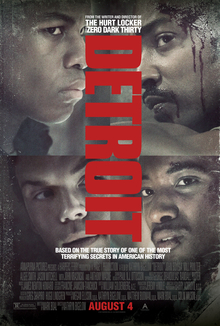
So this is one of those big deal films that are impossible to ignore. Kathryn Bigelow is one of the most important female directors in Hollywood and seems to have made adapting important events like this a cornerstone of her career. Personally I’m not a fan though. Her films are well made and hard hitting certainly but there’s something off about them in their intent and perhaps their governing philosophy. Sadly Detroit feels that a continuation of that pattern to me.
In 1967, a police raid on an illegal club in Detroit causes a mob of the predominantly black residents to gather in protest. This soon turns into a full-scale riot as the mob start fires, loot stores and throw stones at police and other emergency personnel. The governor calls in the National Guard and the Army to keep order. Meanwhile an up and coming R&B group, The Dramatics, are hoping to win a recording contract but find their performance interrupted by the riots. A member and his friend are separated from the others and decide to spend the night at the nearby Algiers Motel. There they meet two white girls partying with some black friends. One of them in a fit of drunkenness shoot at the police outside with a harmless starter pistol. The authorities’ response is immediate and brutal. The one who fired the toy pistol is shot while fleeing but failing to find a weapon, the police detain the rest to interrogate them. A black security officer who had been stationed nearby comes along to see what he can do to help to defuse tensions.
Once again I knew nothing about Algiers Hotel incident that is the subject of this film going in and rather thought that it was about the riots in general. Structurally the film is a bit odd, beginning on a larger scale as riots engulf Detroit, narrowing as attention is focused on the events in the hotel and then There’s a lot going on and many characters to juggle so it’s quite impressive how the film helps viewers keep track of them all. Most of the film feels somewhat like a documentary in that it keeps the characters at arm’s length but the hotel scenes get more personal. As my wife notes, watching that is a harrowing experience as few things are so traumatic as authority figures abusing the power invested in them by the state. The sheer powerlessness of the people caught by the police and the knowledge that nothing that they can say or do really matters anyway is painful to watch. I suppose Will Poulter should be commended for so ably playing the worst police officer of the lot as by the end of the film you’d love nothing more than punch him in the face repeatedly.
As I mentioned however while this is undoubtedly a solid and very well-made film, I have trouble seeing it as high art. The film tries so hard to prove that it is even-handed that it starts fraying at the seams. For example one of the black people escapes from the hotel injuries and immediately runs into a friendly white police officer who remarks about how anyone could inflict such injuries on another human being. It’s on-the-nose and far too maladroit. I’d also argue that while Bigelow does attempt to get into the heads of various characters such as the member of The Dramatics who is severely affected by the trauma, she doesn’t really succeed. The documentary-like nature of the film works against that such that there is a distance between the characters and the audience. Maybe it would have worked better if she had picked one or two characters and consistently stuck with them. As it is, this is a good film about the events of the night but not about the people who got involved in it.
Overall I found Detroit to be an admirable film about an important event but I couldn’t bring myself to like it all that much. Sadly it appears that while the film was well received by the critics, as expected, it bombed spectacularly at the box office, failing to even make back its production costs. I suppose it’s hard for a film like this to find much of an audience outside of the US and even within the US this isn’t exactly a popular cause among white Americans.